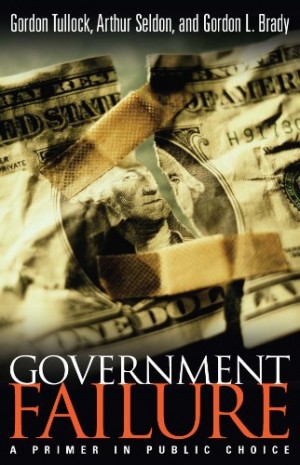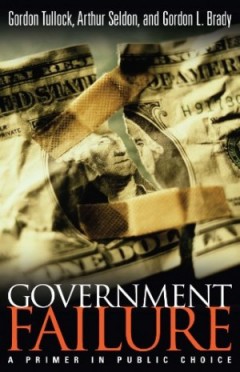
Michael Stackpole, a traditionally published author who was one of the early champions of self-publishing ebooks, has an interesting post analyzing the settlement agreed to by three of the Big Six publishers — Hachette, HarperCollins, and Simon & Schuster — involved in the alleged ebook price fixing flap. If he’s right, the Department of Justice is going to be imposing more injustice than just preventing a little self-destructive collusive fixing of high prices. This is yet another among so many many many examples of the state stepping in to prevent something only to impose that very thing itself. Yes, it looks like the DoJ is going to prevent price fixing of one sort only to impose its own brand of price fixing. But hey, it’s only a bad thing when non-state entities do it, right?
Here is Stackpole’s breakdown of the settlement provisions:
- For a period of two years,
- Publishers will not be able to set a restricted retail price for their product.
- Retailers will be able to set their own price for an ebook, but they cannot discount the bookbelow their own discount. (In short, the retailer cannot sell ebooks at a loss.)
- Publishers cannot “retaliate” against retailers during this time.
- The “favored nation” status that prevented a publisher from selling at a lower price to one retailer over another is gone.
- The Agency Pricing discount of 30% off the top that retailers pay publishers can remain in place.
- There are compliance procedures being set in place (that I don’t bother discussing) so the government can make sure that the publishers are complying with the agreement.
That’s right. Provision #3 fixes an arbitrary minimum price —a price floor. Retailers like Amazon will not be allowed to sell ebooks below the price they pay publishers for them; they will not be allowed to sell at a loss. For two years. And apparently there is yet more intrusive bureaucracy being set up to monitor compliance with these new regulations for the ebook market. It’s another shovel-ready Obama jobs program!
The federal government is also going to prevent publishers from requiring retailers sell their ebooks for a certain price. In other words, it bans the agency model. Now, I’m no fan of the agency model, and I think it’s self-destructive for publishers to adopt it in order to screw their customers with high prices so that they can prop up their dead-tree book business model for a while longer. But I don’t think they should be prevented by law from doing so.
Stabilization is Chaos: “Monetary policy all over the world has followed the advice of the stabilizers. It is high time that their influence, which has already done harm enough, should be overthrown.”
— F.A. Hayek, 1932
The federal government is also going to prevent publishers from retaliating against retailers for the prices they set. Also, no more contracts that stipulate publishers can’t sell to other retailers at a lower price. In other words, the state is going to short circuit the market process by preventing publishers from putting any kind of meaningful pressure on retailers and vice versa. No jockeying for position in the ebook market. Forget letting consumers decide and the best business model win. The United States federal government prefers stasis — the maintenance of a status quo of its own making.
But wait, there’s more. Stackpole does the math and argues that far from preventing publishers from fixing high prices for consumers, the settlement will actually disincentivize both publishers and retailers from setting lower prices:
First off, the suit was brought because prices were too high to the consumers. Notice any relief/rebates to consumers? Me, neither. Your tax dollars aren’t getting you any return on your investment there.
Second, let’s apply numbers to the above. Amazon has tried, for ages, to keep ebook prices at $9.99, to make ebooks attractive. Under this settlement, then, a publisher releases a book at a $13 price point, Amazon discounts it to $10, breaking even on the deal, at the 70/30 Agency Model split level. Amazon could then say to publishers, any book priced over $13, we’ll only buy at a 50% discount. So, a $15 book drops to $10. In this latter case, the publisher makes $7.50 and Amazon clears $2.50. The $15 price point is more profitable for Amazon than the $13 price point, and it appears they’re giving consumers a greater discount. So, the impetus for Amazon to want books priced below $15 is exactly what? Zero. And for the publishers, their max profit potential is at $20 or above, so why would they price things lower?
So, the settlement doesn’t guarantee lower prices for readers. In fact, by doing the same math above that I’ve done, or by just reading this blog post, publishers can independently decide what the best price points are when selling ebooks. This isn’t changing business practices, this is just forcing folks to modify spreadsheets.
Hey, symbolic gestures and creative accounting that pretend to be for the good but in actuality cause disguised harm — that’s what the state does best, none better.
When you think about it, the very concept of anyone having a monopoly on virtual products in the information age is just silly. — Michael Stackpole
Stackpole follows up this analysis with an anecdote that shows just how little traditional publishers care about, or have an incentive to care about, their suppliers (authors) and their customers (the readers). He also touches on the “rising cost of paper” excuse for rising dead-tree book prices.
For those who will ignorantly or dishonestly claim that Amazon is the only winner in this and that the settlement will solidify it’s “monopoly” over the ebook market and allow it to suddenly, and uncharacteristically, start charging high monopoly prices for ebooks, Stackpole preemptively points out:
- Amazon, in the past, has reacted very badly when faced with negative backlash from its consumer base. One might recall that the first time Amazon tried to raise a book price over $9.99, the infant Twitter community called for a boycott. News went viral and Amazon backed down. Moves to raise prices or lower discounts to indie authors would engender that same backlash.
- Lowering discounts to indie authors would allow Apple, Barnes & Noble, Google and Kobo to appeal strongly to indie authors, offering them deals that include promotion. One must remember that the best of the indie authors are those who have built an audience and can carry that audience with them. Amazon would, in essence, be providing their competitors with the means to establish “exclusive content.” While it might not hurt Amazon’s bottom line for a long time, it would establish its competitors as the new darlings of indie publishing, and brand Amazon as being greedy. It’s literally more trouble than it’s worth for Amazon.
- Hello Piracy! Piracy occurs when the perceived value of an item is much less than its actual cost. Were Amazon to jack prices, pirates and rival retailing sites would spring up all over the place. Authors would band together to create coop sites to sell directly. Webstore sites would establish dedicated and low cost author packages, and set up websites where they aggregate the author stores so they can promote books. When you think about it, the very concept of anyone having a monopoly on virtual products in the information age is just silly.
- Though I do not think publishers will use the two years of the settlement wisely, they really should be thinking about establishing their own stores. I mean, if an author can do it, so can Random House. Moreover, publishers should secure deals with authors that allow authors to sell books from their own websites, returning to the publisher the same amount of money any retailer would send them. I’d happily retail books at their full MSRP off my website and send my publisher checks (just to have them send me a smaller slice back six months later); since the 30% I’d make now is a heck of a lot more than the eventual cut I’ll get through my royalties.
Unlike Lance Ulanoff, Michael Stackpole gets it. And Stackpole isn’t even a journalist! But maybe that’s why he gets it.
All in all I think the settlement, and any likely outcome of the lawsuit, is a badly done show of shadow puppets. The suit started for relief to the consumer, but nothing in the settlement provides any relief to the consumer.
Not only that, the settlement prevents relief to the consumer by preventing retailers from taking a loss on ebook sales and encouraging publishers and retailers to set higher prices in order to take advantage of this state-imposed price floor.
Michael Stackpole is right: the only true beneficiaries of the settlement are, as usual, employees of the United States federal government.
Read his full article: “The Anti-Trust Suit Settlement — A Layman’s Opinion.”















